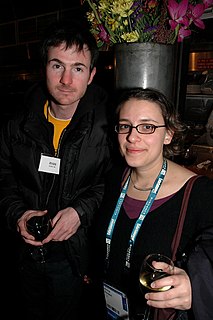A Quote by Angela Ahrendts
I think when you're empathetic, you're putting yourself in somebody else's shoes, right? It's not about you.
Related Quotes
I think that's true of all cinema, that's why cinema is the great humanistic art form. Whatever the film is, it doesn't matter what the film is about, or even whether it's a narrative or figurative film at all, it's an invitation to step into somebody else's shoes. Even if it's the filmmaker's shoes filming a landscape, you go into somebody else's shoes and you look out of their lens, you look out of their eyes and their imagination. That's what going to the pictures is all about.
The characteristic of the first sort of religion is imitation. It insists on imitation: imitate Buddha, imitate Christ, imitate Mahavir, but imitate. Imitate somebody. Don`t be yourself, be somebody else. And if you are very stubborn you can force yourself to be somebody else. You will never be somebody else. Deep down you cannot be. You will remain yourself, but you can force so much that you almost start looking like somebody else.
Anytime I get an acting role, I find a way to learn about something new, or heal a part of my life that I didn't know was hurting. I think anybody could benefit from taking acting classes. You don't necessarily have to want to be an actor or pursue the acting business. But just taking an acting class, you're going to learn so much about life and what it's like to walk in somebody else's shoes. It helps you stop judging people. It does something to you where you become empathetic to people's plights and journeys, and it makes you a little more understanding and caring.
You get told a lot in school to tell what you know, write what you know. But what excites me about filmmaking, about being a storyteller, is being able to learn about other people, putting myself in somebody else's shoes, whether that be someone from the Dominican Republic or someone from Cuba or inner-city Brooklyn.
I think that when you put yourself, as actors have to do, in other people's shoes, when you have to put on the costume that someone else has worn in their life, it gets much, much harder to be prejudiced against them and even to be - to not try to look at the world in a sense of "I'm not going to judge somebody. I'm going to try to understand who they are and what they're about."



































